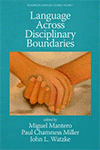
Language Across Disciplinary Boundaries
Edited by:
Miguel Mantero, The University of Alabama
Paul Chamness Miller
John L Watzke, International Society for Language Studies, Inc.
A volume in the series: Readings in Language Studies. Editor(s): John L Watzke, International Society for Language Studies, Inc.. John W. Schwieter, Wilfrid Laurier University.
Published 2022
The International Society for Language Studies (ISLS) inaugurates its first volume in the series Readings in Language Studies with Language Across Disciplinary Boundaries, a text that represents international perspectives on language and identity, critical pedagogy, language and power, perspectives on second language acquisition and teacher education. Founded in 2002, ISLS is a world-wide organization of volunteers, scholars and practitioners committed to critical, interdisciplinary, and emergent approaches to language studies.
CONTENTS
Acknowledgments. Introduction. SECTION I: CRITICAL PEDAGOGY. Empowerment and Its Limitations: Considering Why “Things Go Wrong” in Second Language Classrooms, Elizabeth R. Miller. Re-authoring: Language Learners and Shifting Identities, Kristen Campbell Wilcox. Task-Based Critical Pedagogy in Japanese EFL Classrooms, Keiko Konoeda, Yukiko Watanabe. Japanese University Student’s “Authorship” in EFL Classroom: Investing in Language Learning, Takayo Kawabe. SECTION II: LANGUAGE AND POWER. Subordination and Submission in the Second-Language Classroom, Gerrard Mugford. Interpreters’ Use of Politeness Markers as a Linguistic Tool for Controlling Power Relations in Immigration Hearings, Marjorie Zambrano-Paff. Becoming Citizens: Punjabi ESL Learners, National Language Policy and The Canadian Language Benchmarks, Douglas Fleming. “Hey, Take it Easy”: Language Performance and Ideology in Oaxaca, Mexico, Peter Sayer. Sentiment of Personal and Collective Efficacy of Francophone School Principals: Implementation of the VelTIC Hypermedia System of Resources, Claire IsaBelle, Hélène Fournier, François Desjardins, Phyllis Dalley. SECTION III: LANGUAGE AND IDENTITY. Coping with Isolation in Negotiation of Identities: the Role of Language Views, Hiroko Itakura, Gillian Humphreys. Shifting Linguistic Identities in Interaction: The Case of a French-English Bilingual, Linda R. Waugh. Language Learning and Cultural Identity in Study Abroad Contexts: Portrait of a Japanese High School Exchange Student in the U.S., Reiko Habuto Ileleji. A Case Study of a Chinese ENL Child’s Identity Trajectory and Bilingual and Biliteracy Development: Children’s Perspective, Xiaoning Chen. Representations of Multilingualism and Language Investment in a Globalized World, J. Byrd Clark. SECTION IV: PERSPECTIVES ON SECOND LANGUAGE ACQUISITION. Community Service Learning and L2 Students’ Intercultural Communicative Competence, Gabriela C. Zapata, Wojciech Tokarz. Oral Corrective Feedback: A Guide for L2 Classroom Teachers, Paul Chamness Miller. Correction of Classroom Oral Errors: Preferences of Japanese EFL Students, Akemi Katayama. Making our Learning Environments Interactive: A Critique of the Concept of Interaction in Second Language Acquisition Studies, Ania Lian. From Syntactic Acceptability to Rhetorical Quality Through Explicit Grammar Instruction and Extensive Analytic Practice, Fengying Xu. SECTION V: CONCEPTUALIZATIONS OF LANGUAGE. How Do We Know What Words Children Know? Methods and Modifications, Marc H. Bornstein, Annick De Houwer, Diane L. Putnick, Mark A. Cusick. Assessment of English Language Learners and Learning Disabilities with Consideration of Ethno-cultural Background, Susana V. Rivera-Mills. The Effects of Bilingual Type on Language Selectivity, John W. Schwieter. A Study of Task Type for L2 Speaking Assessment, Huei-Chun Teng. Accidental Humor in International Public Notices Displayed in English, Mohammed Farghal. SECTION VI: TEACHERS AND TEACHING. A Look at Language Classroom Motivation in a Collectivist-Oriented Setting, Bokyung Murray. Sociocultural Aspects of Teaching Japanese as a Foreign Language: Transforming Japanese Language Classrooms Into Small Japanese Societies, Hidehiro Endo. Will my Smart Classroom Make Me Change? Reflections of Two Spanish Instructors, Vanessa Lazo-Wilson. The Influence of Environment on Children’s Writing and Drawing, Sandra Stanko. Shifting Goals, Instructor Roles, and Japanese University Students’ English Study Methods, Brian G. Rubrecht. The Impact of Practicum on Pre-Service Teachers’ Self-Development, Mine Dikdere. Distance Pre-Service Teachers’ Perceptions of the Effectiveness of Their Pedagogical Courses in Preparing Them for Their Teaching Life, Belgin Aydin. Support for English Language Learners in K-12 Classrooms: Are Internationally Educated Teachers Better Positioned? Farahnaz Faez. Teachers’ Beliefs about Language Learning Strategies: An Exploratory Study, Brian G. Rubrecht. Humor as a Teaching Device, Said M. Shiyab. Content-Based 5C Projects of a City Guide Webpage in Japanese, Junko Hatanaka. Index. About the Contributors.
-
Paperback978-1-64802-753-6
Web price: $62.04 (Reg. 72.99)
-
Hardcover978-1-64802-754-3
Web price: $89.24 (Reg. 104.99)
- eBook978-1-64802-755-0

- EDU005000 - EDUCATION: Bilingual Education
- EDU029000 - EDUCATION: TEACHING METHODS & MATERIALS: General
- EDU044000 - EDUCATION: Classroom Management








